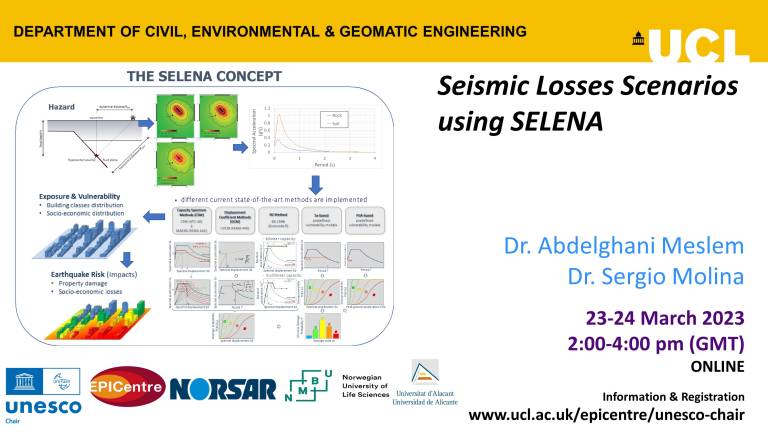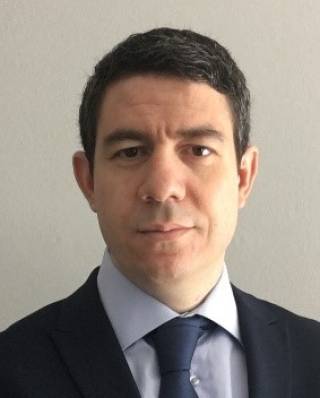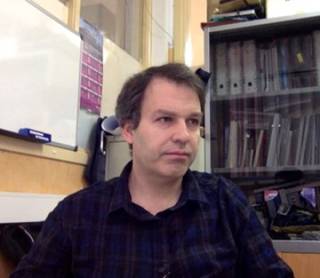Seismic Losses Scenarios using SELENA
28 February 2023
In this webinar organized by the UNESCO Chair in DRR&RE at UCL, the presenters will introduce the SELENA (Seismic Loss Estimation using a Logic Tree Aprroach) software tools along with example applications and hands-on exercise.

This two days webinar will present about the SELENA and its application via hands-on exercise. SELENA (Seismic Loss Estimation using a Logic Tree Approach) is a software tool for seismic risk and loss assessment using the engineering-based approach. SELENA works independently of any Geographic Information System and the epistemic uncertainties related to the input parameters are represented using a logic tree-computation scheme. Computation results are provided for each branch of the logic tree as well as statistical median values with corresponding confidence levels.
SELENA is open for any user-defined input data and can therefore be applied to any built environment of the world. The user has to supply a number of input files in a simple pre-defined ASCII format and all output files are also provided in plain ASCII format.
Schedule
Day 1 (UK time)
14:00 | 14:15 | UNESCO Chair Introduction | Prof. Dina D’Ayala |
14:15 | 14:55 | Introduction to SELENA | Dr. Abdelghani Meslem |
14:55 | 15:00 | Break |
|
15:00 | 15:45 | Some examples of SELENA application all over the world | Dr. Abdelghani Meslem |
15:45 | 16:00 | Introduction to hands-on example and Q&A | Dr. Sergio Molina |
Day 2 (UK time)
14:00 | 14:15 | Discussion on the exercise problem (seismic risk study for Philippines) | Dr. Sergio Molina |
14:15 | 14:45 | Case Study: Preparing SELENA input files | Dr. Sergio Molina |
14:45 | 14:55 | Case Study: Running SELENA (using the Matlab or the standalone version) | Dr. Sergio Molina |
15:00 | 15:30 | Case Study: Understanding and plotting SELENA results in QGIS | Dr. Sergio Molina |
15:30 | 15:45 | Panel discussion with invited specialists | Dr. Arianna Guardiola-Villora; Dr. Dexter Sumaylo Lo; Dr. Dominik H. Lang; Dr. Yogendra Singh |
15:45 | 15:55 | Extended discussion with the participants and Q&A | All |
15:55 | 16:00 | Closure | Prof. Dina D’Ayala |
About the Speakers
Dr. Abdelgani Meslem

Dr. Abdelghani Meslem is a Senior Research Engineer at NORSAR, a Norwegian research institute within the field of geoscience, and also affiliated to the (NMBU) as an Associate Professor in Structural Dynamics. Dr. Meslem earned his PhD in earthquake engineering from Chiba University, Japan, and he has been involved in various international projects related to seismic resilience and risk assessment studies; development and implementation of earthquake-disaster risk reduction and mitigation measurements; development of guidelines document, software and tools for risk assessment. Dr. Meslem has substantial experience in collaboration projects within industry, academia and governmental organizations.
Dr. Sergio Molina

Dr. Sergio Molina has a Bachelor and a PhD in Physics by the University of Granada. He has a full-time Lecturer position in the University of Alicante-UA (Department of Applied Physics, Physics of the Earth section) and he is member of the “Earthquake Engineering and Seismic Risk” research group at the UA. He started several research lines in Seismic Hazard and Seismic Risk here and achieved the signing of collaboration agreement between the University of Alicante and NORSAR (Kjeller, Norway). Through this agreement, he has participated in several research projects related with the evaluation of seismic hazard, seismic microzonation of urban areas and it allowed him to start a new research line in Seismic Risk using analytical methodologies which made possible the creation of SELENA, an open-source software to estimate seismic risk. He has published more than 50 indexed scientific papers and participated in many international scientific congresses.
Links
 Close
Close

